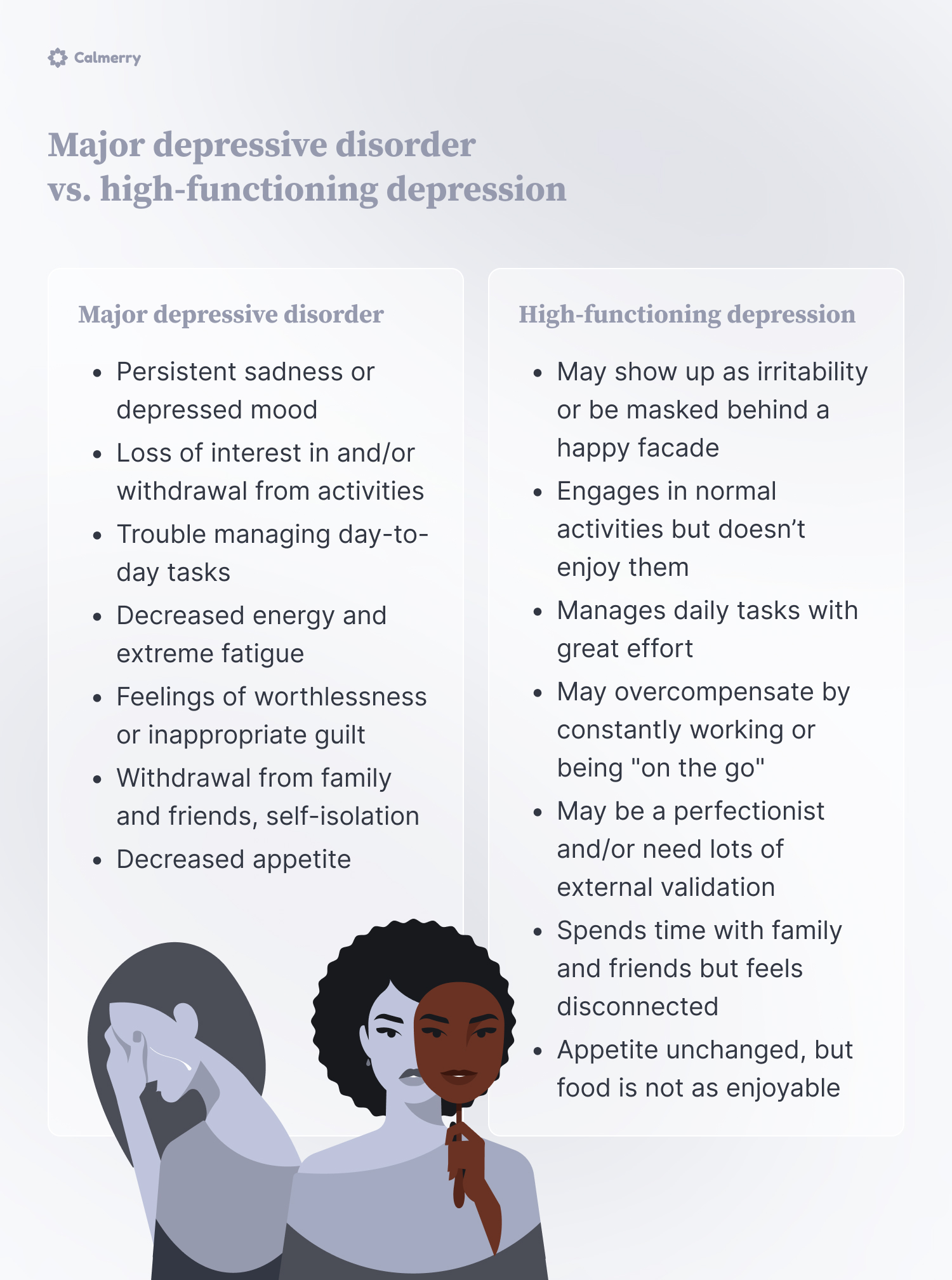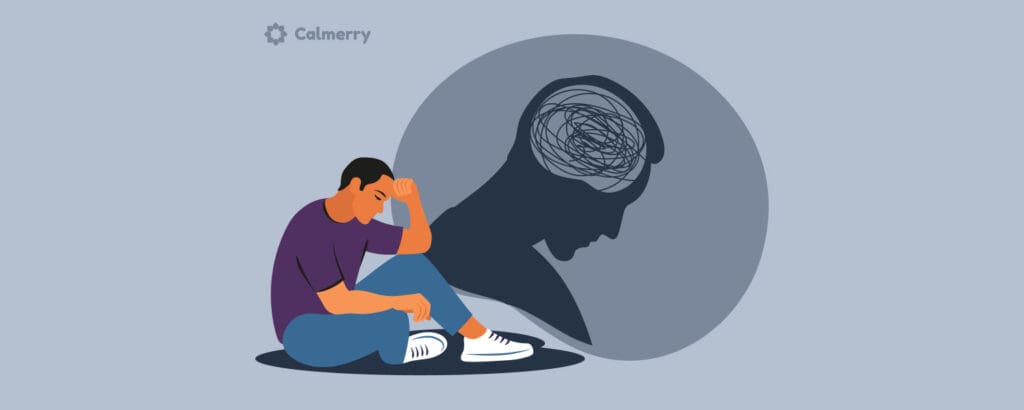The Silent Suffering of High-Functioning Depression

In this article
In recent years, actors, athletes, musicians, and other public figures have opened up about their struggles with depression. Lady Gaga, Dwayne “The Rock” Johnson, and Michael Phelps are celebrities who objectively seem to “have it all,” but unfortunately, depression does not discriminate.
While some people with depression fit the stereotype of the withdrawn, tearful person curled up in bed, others show no external signs.
These people go to work, socialize, and meet their responsibilities. From the outside, it appears like they’ve got it all together, but internally, they are suffering from high-functioning depression.
This article will review the signs and symptoms of high-functioning depression, who is most at risk, and the treatments available.
What is high-functioning depression?
High-functioning depression is not an official medical diagnosis. It is a lay term used in popular culture to describe someone who has symptoms of depression but shows few or no outward signs.
Whereas people with major depressive disorder often experience difficulty at work, home, or in their social lives, people with high-functioning depression function in these areas without apparent impairment.
Invisible to observers, however, is the amount of emotional and physical energy it takes for people with high-functioning depression to get through the day.
People with high-functioning depression are sometimes unaware they are suffering from a mental health condition. They think if they were stronger or worked harder, they wouldn’t have so much trouble in their day-to-day lives.
Other times, they are aware of their depression but go to great lengths to hide what they are going through, often behind a mask of constant cheerfulness. For this reason, high-functioning depression is sometimes called smiling depression.
If you suspect you can relate, you may benefit from this smiling depression test.
Is high-functioning depression real?
Just because high-functioning depression is not an official diagnosis doesn’t mean it’s not a real condition.
Still, some mental health professionals hesitate to use the term for fear of exacerbating the stigma associated with depression. They believe we wouldn’t need the “high-functioning” qualifier if people didn’t have such negative associations with depression.
Other concerns about using the term focus on misconceptions about depression that can happen as a result.
For example, people might falsely assume that high-functioning depression is less serious than other types of depression. Alternatively, they might conclude that all people with depression can be high-functioning if they just put their minds to it, exacerbating the myth that the condition is “all in their head.” [1] Chiu, A. (2022, September 8). What does ‘high-functioning depression’ mean? We asked experts. Washington Post. https://www.washingtonpost.com/wellness/high-functioning-depression-meaning-symptoms/
Like other forms of depression, high-functioning depression is a serious condition that can be debilitating if left untreated.
People with this form of depression suffer many of the same symptoms as people with other types of depression. They just suffer in solitude and behind closed doors.
What are the symptoms of high-functioning depression?
Symptoms often present differently in people with high-functioning depression.
For example, where people with major depressive disorder might make self-critical statements, those with high-functioning depression may develop perfectionistic tendencies to conceal feelings of worthlessness.
While people with depression often withdraw from their usual activities, people with high-functioning depression force themselves to participate even though they don’t enjoy it.
The chart below shows some different presentations of major depressive disorder versus high-functioning depression.

In addition to the above, both high-functioning depression and major depressive disorder can cause the following:
- Bleak thoughts about the future
- Insomnia
- Diminished ability to experience joy
- Guilt
- Loneliness
- Difficulty concentrating
- Physical symptoms such as headaches, stomachaches, or other forms of chronic pain
- Thoughts of death or suicide*
*NOTE: These thoughts may not be overtly expressed, particularly in those with high-functioning depression. Instead, people with high-functioning depression might show behavioral symptoms such as giving away their belongings, acting recklessly, or mood swings. If you or someone you know is at risk of suicide, call your local suicide hotline or emergency services number.
High-functioning depression vs. persistent depressive disorder
Some mental health experts believe that what people call high-functioning depression is actually persistent depressive disorder, or PDD.
Also called dysthymia, PDD is a clinical diagnosis characterized by long-standing symptoms of sadness, hopelessness, and lethargy. People with persistent depressive disorder might have some but not all of the symptoms of major depressive disorder or have multiple symptoms that are less severe.
Other mental health professionals argue that high-functioning depression differs from persistent depressive disorder in key ways.
For example, to be diagnosed with persistent depressive disorder, you have to have symptoms for at least two years, whereas high-functioning depression can be shorter in duration. Also, persistent depressive disorder causes impairment in one or more areas of life, whereas someone with high-functioning depression typically shows no such impairment.
In sum, there are different opinions about the overlap between high-functioning depression and persistent depressive disorder. A licensed mental health professional can provide the most accurate assessment and diagnosis.
Who is most at risk of high-functioning depression?
High-functioning depression, like other forms of depression, can affect individuals from all walks of life; there is no one-size-fits-all profile.
However, some personality factors may be associated with an increased risk of high-functioning depression. These include:
- Type A personalities – people who strive for success and achievement may be particularly at risk of high-functioning depression. This could be because they have high standards and put pressure on themselves to constantly appear like they have it all together.
- People-pleasers – people-pleasers might be more likely to conceal symptoms of depression for fear of upsetting or disappointing people. They put others’ needs ahead of their own, sometimes neglecting the self-care that is vital to good mental health.
- BIPOC communities – communities that have historically had limited access to mental health services may also be at increased risk of high-functioning depression. Psychologist Jameca Woody Cooper notes that within these cultures, there is often a greater stigma associated with mental illness, so people are less likely to reach out for help.
- Public figures – people who live their lives in the public eye may be more likely to develop high-functioning depression due to increased pressure to “maintain appearances.”
Now that you understand the symptoms and risks of high-functioning depression, let’s look at the different treatments available.
What is the treatment for high-functioning depression?
I found that, with depression, one of the most important things you could realize is that you’re not alone. You’re not the first to go through it; you’re not going to be the last to go through it… Have faith that on the other side of your pain is something good. [2] Dwayne Johnson and girlfriend are cooking up a baby girl. (2015, November 17). [Video]. TODAY.com. https://www.today.com/health/dwayne-rock-johnson-shares-inspiring-message-people-depression/
– Dwayne “The Rock” Johnson
With any form of depression, hopelessness comes with the territory. Depression can make you feel like nothing will help, that the problem is you. People with high-functioning depression may feel even more ashamed of their symptoms and less likely to reach out for support.
However, high-functioning depression can be effectively treated. Which treatment is right for a specific individual will depend on the circumstances, but there is, in fact, “something good” on the other side.
Here are some common treatments for high-functioning depression:
1. Psychotherapy
Also called talk therapy, psychotherapy involves meeting one-on-one with a licensed mental health professional to process your feelings and experiences.
There are many different types of psychotherapy for depression.
For example, cognitive-behavioral therapy helps identify and change negative thought patterns and behaviors. And online therapy offers all the benefits of in-person therapy plus the added convenience of video sessions and text communication.
At Calmerry, you can be matched with an experienced mental health professional for your particular needs within 1 hour.
2. Medication
In some cases, your healthcare provider may prescribe an antidepressant medication, such as selective serotonin reuptake inhibitors (SSRIs), to alleviate your symptoms.
These medications work with your natural brain chemistry to restore the balance of neurotransmitters involved in mood regulation.
3. Lifestyle changes
Because of the mind-body connection, your daily habits impact your mental well-being. Nutrition and exercise, restoring work-life balance, avoiding drugs and alcohol, and improving the quality and duration of sleep can all help to alleviate symptoms of high-functioning depression.
4. Support groups
Support groups can provide a sense of community and mutual support, which can be particularly valuable in counteracting the isolation and loneliness associated with different types of depression.
The Anxiety and Depression Association of America keeps a directory of support groups on its website.
5. Stress reduction techniques
Finally, stress management techniques can help to combat high-functioning depression. For example, mindfulness meditation teaches you to be more aware and accepting of your thoughts and feelings instead of responding with self-criticism.
On a final note
A licensed mental health professional will be best able to evaluate your symptoms and recommend the best treatment approach.
Although reaching out for help can feel daunting, consulting a therapist is the first step toward easing the suffering associated with high-functioning depression.
As Lady Gaga wrote in an op-ed for the Guardian, “We can no longer afford to be silenced by stigma or stymied by misguided ideas that portray [mental health conditions] as a matter of weakness or moral failing.”
Chiu, A. (2022, September 8). What does ‘high-functioning depression’ mean? We asked experts. Washington Post. https://www.washingtonpost.com/wellness/high-functioning-depression-meaning-symptoms/
Dwayne Johnson and girlfriend are cooking up a baby girl. (2015, November 17). [Video]. TODAY.com. https://www.today.com/health/dwayne-rock-johnson-shares-inspiring-message-people-depression/
online therapy
live video session




